21 Amazing Benefits Of Citrus Fruits For Skin, Hair, And Health
Not only do they make for refreshing juices, but they also help improve your well-being.
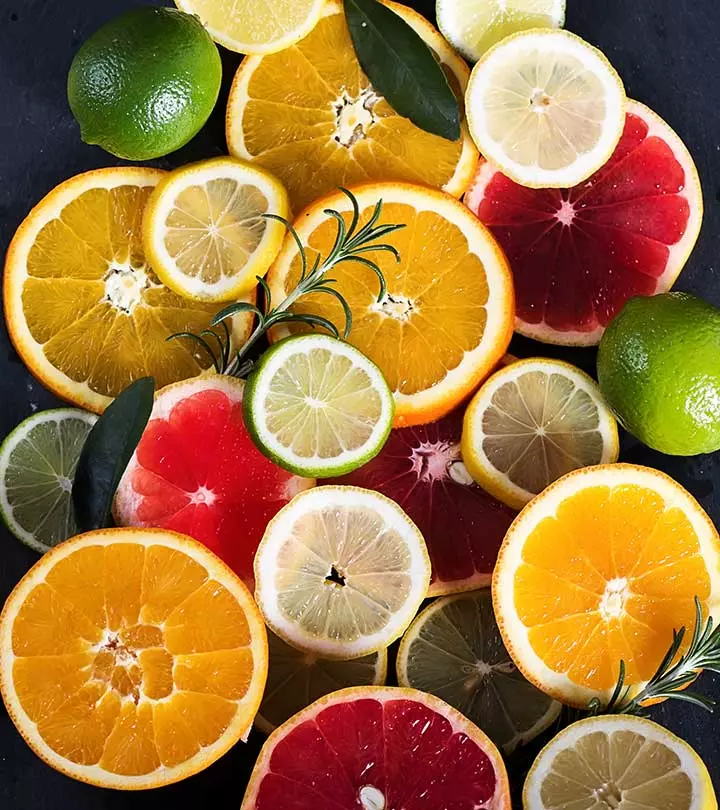
Image: Shutterstock
There are several advantages of using citrus fruits for skin care. Fruits of the citrus family include grapefruits, oranges, limes, and lemons. They are thought to have originated in South Asia and are now cultivated worldwide. Citrus fruits are rich in vitamin C, which gives them an edge over other fruits and helps address many skin troubles. This article discusses the benefits of citrus fruits for skin and health, their nutritional profile, and their side effects. Keep reading.
 Know Your Ingredient: Citrus Fruit
Know Your Ingredient: Citrus FruitWhat Is It?
A type of fruit known for its tangy flavor and high vitamin C content.
What Are Its Benefits?
Aids weight loss, ensures youthful skin, and prevents hair loss, and reduces the risk of cancer.
Who Can Consume It?
All except individuals with peptic ulcers or gastroesophageal reflux disease (GERD).
How Often?
At least 2 servings per day.
Caution
Their highly acidic nature may irritate the digestive system in some individuals.
In This Article
What Are Citrus Fruits?
are fruits produced by trees and shrubs belonging to the Rutaceae genus of plants. They include fruits like oranges, grapefruits, lemons, and lime. They have a high citric acid content and are typically round or elongated with a juicy, fleshy pulp surrounding their seeds. The peel of citrus fruits is leathery, the outermost layer of which is called ‘zest’ that is used in the preparation of many desserts for its flavor. The peel is covered underneath with a white, spongy pith. Typically, a citrus fruit can be found separated into segments (called ‘liths’) after peeling. You know those white hair-like things that you pick off of an orange slice before popping it into your mouth? They actually provide nutrition to the fruit as it grows.
Though it was originally believed that they originated from a small part in Southeast Asia that includes areas of Northeast India, Myanmar, and Yunnan (in China), recent studies suggest that citrus fruits could originally have been native to Australia, New Caledonia, and New Guinea.
These juice laden fruits have to be peeled before consumption. They can be eaten raw, or they can be juiced. They are also used to make pickles and marmalades. Acidic citrus fruits, such as lime, are served as garnishes for many dishes and are also a key ingredient in cocktails. The benefits of lime extend to its potential to exfoliate the skin and scalp when applied topically, and regular healthy consumption may also help alleviate some symptoms of conditions like piles and arthritis.
Besides being delicious, citrus fruits are also a treasure trove of nutrients.
Key Takeaways
- Citrus fruits are high in fiber which aids weight management.
- These fruits can also prevent dandruff and strengthen your hair.
- Due to their high vitamin C content, these fruits have an anti-aging effect on the skin as they help maintain its elasticity.
- Further, the antioxidants in citrus fruits enhance immune functions and help prevent common diseases.
What Nutrients Do Citrus Fruits Contain?
| ORANGE | GRAPEFRUIT | TANGERINE | |
| Weight (g) | 131 | 236 | 84 |
| Energy (kcal) | 62 | 78 | 37 |
| Fiber content (g) | 3.1 | 2.5 | 1.7 |
| Ascorbic acid (mg) | 70 | 79 | 26 |
| Folate (mg) | 40 | 24 | 17 |
| Potassium (mg) | 237 | 350 | 132 |
Citrus fruits are chock-full of nutrients that provide a host of health benefits. Those who are weight conscious and would like to avoid calories will be happy to know that citrus fruits are quite low in calories. A medium-sized orange contains about 60 to 80 kcal while a grapefruit contains about 90 kcal.
The simple carbohydrates found in citrus fruits are glucose, sucrose, and fructose. The dietary fiber found in citrus fruits contains pectin that binds with cholesterol and helps flush it out of the body.
A study compared serum vitamin C levels of American adults in the year 2017-18. According to it, vitamin C deficiency was found to be higher in smokers and individuals with low dietary intake. Only 4.7% of non-Hispanic Asian individuals had the deficiency, which was much lower when compared to non-Hispanic white people. Additionally, the study observed that people with a high income had only a 5.2% prevalence of low vitamin C levels compared to those with low incomes.
The one nutrient that citrus fruits are most famous for providing is vitamin C (ascorbic acid). In fact, a medium orange manages to give you 130% of the daily requirement of this amazing nutrient. Other important nutrients provided by citrus fruits include folate, lycopene, potassium, vitamin B6, magnesium, niacin, thiamin, and phytonutrients.
 Trivia
TriviaSince they contain such a wide variety of nutrients, it is but obvious that they provide a range of benefits for our health, skin, and hair. Just keep reading to know what they are.
Do They Have Any Benefits For The Skin?
Citrus fruits are known not only for their high vitamin C content but also for their refreshing fragrance.
The citric acid present in these fruits kills bacteria and other pathogens present on the skin, making your skin feel fresh and clean. They occupy a special space in aromatherapy because of their fragrance.
The amazing skin benefits of citrus fruits include the following:
1. Keep Your Skin Looking Young

When it comes to skin health, vitamin C (ascorbic acid) is right on top of the list of nutrients that you need to keep your skin looking young. Ascorbic acid is essential because it helps regenerate collagen, which maintains the elasticity of your skin. The consumption of citrus fruits becomes even more important here because not only does the amount of collagen reduce in our skin with aging but also because our body cannot naturally produce it (1), (2).
2. Exfoliate Your Skin
Grossed out by your clogged pores and all the dead skin on your face? Then, orange peels are here to your rescue! Orange peel benefits for the skin are mostly attributed to its vitamin C content, which is a great exfoliating and cleansing agent. It clears all old, dead skin cells and shrinks pores to leave your skin looking clear and glowing (3).
3. Reduce Pigmentation
Dark spots and pigmentation occur when your skin is exposed to the ultraviolet rays of the sun. The UV rays deplete the antioxidants in your skin, thus causing oxidative damage (4). The vitamin C in citrus fruits prevents pigmentation and UV-induced photodamage. For this purpose, you can either consume citrus fruits or apply their juice topically.
Are there any practical applications of citrus fruits in skin care? If yes, what are those? Scroll down to know.
Practical Uses Of Citrus Fruits In Skin Care
There are several methods to use citrus fruits in your skin care regimen. Here are a few ways:
- Prepare a natural face mask with honey and lemon juice for a radiant glow.
- Dry and grind citrus peels into a powder to use as an exfoliator to get clear skin.
- Use citrus-infused oils in massages for their refreshing aroma and skin-benefitting properties.
- Add citrus juice to homemade scrubs to enhance their exfoliating properties.
These useful applications offer natural, nourishing solutions for healthy, radiant skin in addition to improving your skin care routine.
Any Benefits For The Hair?
Who doesn’t love soft, shiny, and long hair? The one nutrient that can help you achieve the hair of your dreams is vitamin C. And you know which fruits are filled to the brim with this magic nutrient? Citrus fruits, of course!
Some amazing hair benefits of citrus fruits include:
4. Prevent Hair Loss And Strengthen Hair

Studies show that collagen has beneficial bioactive properties that can help enhance your hair quality (5). So, load up on those vitamin C-rich citrus fruits as this nutrient is not naturally produced by our body.
5. Fight Dandruff
When applied to your hair, the acidic nature of lemon juice helps deep clean your scalp and get rid of all the dandruff. It also reduces the dullness in your hair and makes it look thicker and shinier (6).
What Are The Benefits For Health?
Citrus fruits are low in calories and are beneficial for weight watchers and diabetics. Additionally, they do not contain any saturated fats or cholesterol that are oh-so-harmful to your health. Citrus fruits also help flush toxins out of your body.
Some of the other amazing health benefits of citrus fruits include:
6. Work Wonders For Weight Loss

Citrus fruits like oranges and lemons, when paired with a low-calorie diet, work brilliantly in helping you lose weight. This is because aside from being low in calories, they also have a high water and fiber content that fills you up and prevents you from feeling hungry (7, 8).
7. Lower The Risk Of Stroke In Women
All you women out there, here’s some good news for you. A recent study conducted by Norwich Medical School has found that citrus fruits like orange and grapefruit contain components called flavanones that helped reduce the ischemic strokesi A type of stroke caused by a blood clot in the artery that supplies blood and oxygen to the brain. in women by a staggering 19%. The lead author of this study, however, does urge people to consume citrus fruits as is (as opposed to drinking their juice) to ensure you obtain the maximum amount of flavanones from the fruits (9).
8. They protect against cancer
A study conducted at Harvard found that citrus fruits contain components like flavonoids, folate, carotenoidsi A class of naturally occurring yellow and red pigments in plants, which work as antioxidants and have numerous health benefits. , and vitamin C that significantly reduce the risk of esophageal cancer (10).
Vitamin C and a specific flavonoid (nobiletin) found in citrus fruits are also supposed to be antiangiogenici Substances that inhibit the growth of new blood vessels in tumors and are commonly used in cancer treatment. . This means that they prevent the formation of new blood vessels that help in spreading the cancer to other areas of the body (11).
The risk of developing epithelial ovarian cancer was also found to be significantly lower in women who consumed citrus fruits, owing to the flavonones found in them (12).
According to the American Cancer Society, citrus fruits are especially helpful in lowering the risk of stomach cancer (13).
9. Maintain The Health Of Your Eyes

We already know that citrus fruits are rich in vitamin C. But it’s interesting to note that this vitamin not only helps maintain the health of the blood vessels in your eyes, but it is also essential to reduce the risk of developing cataractsi An eye condition where cloudy patches develop over the lens and cause blurred vision, which may lead to blindness. and age-related macular degeneration (which is the leading cause of blindness in people over the age of 55 in the Western world) (14).
10. Aid In Lowering The Dosage Of Certain Drugs
Grapefruit has long been associated with dangerous drug interactions due to its ability to slow down the metabolism of certain drugs, thus helping them remain in your system for much longer and increasing their side effects. The folks at the University of Chicago Medicine used this trait of grapefruit and harnessed it to create a positive result. They found that drinking a glass of freshly squeezed grapefruit juice along with the anti-cancer drug sirolimus helped magnify its effects threefold. This could potentially mean that the dosage of this drug can be reduced over time and the patient would, as a result, also have to suffer lesser side effects (15).
11. Help Reduce Stress

Two major reasons for a rise in stress levels are the increase of the hormone cortisol (also known as the stress hormone) and a rise in blood pressure during high anxiety situations. The vitamin C found in citrus fruits works to combat both these issues and reduces stress (16).
12. Boost Immunity
Besides the vitamin C and vitamin B6 that they are most famous for, citrus fruits also contain many plant compounds such as flavonoids, carotenoids, and essential oils that are responsible for a majority of the health benefits associated with them (17).
The vitamin C found in citrus fruits is especially important as it is not only anti-inflammatory, antiviral, and antibacterial, but it also works to boost your immune system (18).
Citrus fruits are great sources of not just dietary fiber but soluble dietary fiber, which has many health benefits (19). This soluble dietary fiber has been found to be responsible for lower lipid levels and blood pressure, weight loss, improved blood glucose control, reduced inflammation, and improved immune function (20).
 Quick Tip
Quick Tip14. Low In Calories
For people who like to keep track of their calorie intake, citrus fruits are a great way to fill your stomach without taking in too many calories. Following are some citrus fruits along with their calorific content:
Orange: 86.5 kcal (21)
Grapefruit: 51.7 kcal (22)
Tangerine (Mandarin oranges): 103 kcal (23)
Lime: 20.1 kcal (24)
15. Reduce The Risk Of Kidney Stone Formation

Kidney stones form when the citrate levels in your urine drop. Drinking a few glasses of fresh lemonade throughout the day has been found to increase urinary citrate levels and reduce the risk of kidney stone formation (25), (26).
16. Protect The Health Of Your Heart
Citrus fruits contain phytomicronutrients like carotenoids and polyphenols (27). The frequent intake of these nutrients boosts heart health and protects against cardiovascular diseases (28).
17. Protect Your Brain
After just an eight-week trial, which involved making healthy older adults drink flavanone-rich orange juice, the component was found to have a significant positive effect on their cognitive functioni The complex mental abilities of the brain, which includes attention, speed, memory, reasoning, planning, etc. (29). This just goes to show that regular consumption of this marvelous fruit has the potential to protect our brain from neurodegenerative diseasesi Conditions that lead to the damage and destruction of the cells of the nervous system, affecting crucial body activities. .
18. Have Low Glycemic Index
According to the official glycemic index website, “The glycemic index (or GI) is a ranking of carbohydrates on a scale from 0 to 100 according to the extent to which they raise blood sugar (glucose) levels after eating. Foods with a high GI are those which are rapidly digested, absorbed and metabolized and result in marked fluctuations in blood sugar (glucose) levels. Low GI carbohydrates – the ones that produce smaller fluctuations in your blood glucose and insulin levels – is one of the secrets to long-term health, reducing your risk of type 2 diabetes and heart disease (30).”
Citrus fruits have a low glycemic index that has been found to reduce the monthly average blood sugar levels, blood pressure, and coronary heart disease risk in type 2 diabetes patients (31).
19. Help Shorten Colds

Sorry for bursting your bubble, but the vitamin C in citrus fruits does not help in curing colds completely, as it was once thought to do. However, eating a citrus fruit at the first sign of the sniffles can reduce the overall duration of the cold by a day (32).
20. Packed With Potassium
Citrus fruits are packed with the electrolyte potassium (33). The intake of potassium through citrus has been found to reduce blood pressure and the risk of stroke and coronary heart disease in adults. It also reduces the effects of age-related bone loss, renal disease, and kidney stones (34), (35). This potassium is also needed by our body to break down carbohydrates, build muscle, and maintain the regular electrical activity of the heart (36).
21. Are Hydrating
Grapefruit is about 88% water while orange is about 86.8% (21), (22). This super high water content of citrus fruits ensures that your thirst is fully quenched and you feel full without having to load up on calories.
While it sure is great that citrus fruits give you a wealth of nutrients. You can consume delicious citrus fruits such as citron, pomelo and bergamot with cakes and desserts (17), (39). You need to keep in mind that you can obtain their benefits only if you select the right fruits at the market, store them properly, and eat them before they start rotting. Here’s what you need to do…
How Do I Select And Store Citrus Fruits?
First things first, it’s important to note that citrus fruits do not continue to ripen after they have been plucked off the tree. So, it’s important that you pay close attention when picking your fruits at the supermarket. There are a few simple things that you can keep in mind when selecting any citrus fruits.
Selection
- Make sure the rind has no blemishes.
- Pick fruits that feel heavier in your hand as this means that they are juicier.
- Choose fruits that have smooth, finely textured peels as opposed to coarse, heavily dimpled ones.
- Avoid fruits that have tender spots, wrinkled skin, or that have started to rot.
- Go for citrus fruits that have a strong and sweet smell as they tend to be fresher and juicier.
Storage
- A lot of people believe that storing any food item in a Ziploc or an airtight plastic bag or container will help it stay fresher for longer. But that could not be further from the truth when it comes to storing citrus fruits. If you plan on storing your citrus fruits in the fridge, keep them in mesh bags that allow air to circulate and keep away the condensation that makes fruits soften faster. This way, they’ll stay fresh for about 2 to 3 weeks.
- If you prefer storing your citrus fruits on the counter, simply place them in a fruit basket in a well-ventilated place. This way, they will keep for about a week.
Citrus fruits are easy to include in your regular meals if you have chosen and stored them correctly, allowing you to fully enjoy their flavor and nutritional value. Scroll down to learn more about incorporating them into your diet.
Citrus Fruits In Diet
Citrus fruits are an excellent way to add taste and nutrients to your regular meals. Citrus juices can be used as marinades for meats and vegetables to improve their flavor, or you can add citrus slices to salads for a cool, tangy twist. Additionally, citrus zest can be added to baked products, giving cakes, cookies, and muffins a zesty, fragrant taste. Citrus fruits are a versatile and healthful addition to your diet because they can also be blended into smoothies, used in sauces, or just eaten as a snack.
Citrus fruits are great and can benefit your health in a number of ways. But beware! They also come with their fair share of side effects. Read on to find out what they are.
What Are The Side Effects Of Citrus Fruits?
- Fungi Growth
Citrus fruits are susceptible to fungal growth at the farm, during transportation, and even after being bought by the consumer. Some of these molds and yeasts can cause allergic reactions or infection or even grow and produce mycotoxinsi Harmful substances produced by mold in food that can cause disease and even death of other organisms. that can cause diseases. So, make sure you wash the fruit thoroughly before eating it and that you consume it within a few days of buying it.
- Digestive Problems
Some citrus fruits, like oranges, have high fiber content that can cause digestive problems like abdominal cramps and diarrhea.
- Biphenyl Toxicity
To prevent fungi growth, citrus fruits are often sprayed with biphenyl when being packaged. When consumed in acute quantities, this chemical can cause skin and eye irritation. It can also have toxic effects on your kidneys, liver, and central nervous system.
- Heartburn
People who regularly suffer from heartburn or have been diagnosed with gastroesophageal reflux disease (GERD) (also called acid reflux disease), are better off steering clear of citrus fruits as they have high acid content that can aggravate these problems.
- Drug Interaction
There are certain enzymes that are released by your body that help in breaking down medication. Citrus fruits contain some chemicals that could inhibit the release of these enzymes, thus allowing high levels of these medications to stay in your system and potentially exacerbating their side effects.
Citrus fruits are high in potassium. Anyone taking beta-blockers (that also work to increase the potassium levels in your body) should avoid citrus fruits because, in combination with this medication, they can sky-rocket the potassium levels in your body that cannot be easily brought down by their weakened kidneys.
Some citrus fruits, like grapefruit, can interact dangerously with certain medications like antibiotics, cardiovascular drugs, blood pressure medication, organ transplant rejection drugs, and cholesterol lowering drugs. This can lead to kidney failure, respiratory failure, gastrointestinal bleeding, and other such major complications. So, make sure you speak to your doctor about which citrus fruits you can safely consume.
You also need to be careful while consuming these fruits or their juices. Here are some things you need to keep in mind.
Helpful Tips
- The best time to consume these fruits is in the morning on an empty stomach or after a light meal.
- Avoid drinking water after consuming citrus fruits as it might increase acidity in your stomach.
- Do not preserve citric fruits for a long time since the nutritional value reduces with extended shelf life. Opt for fresh fruits in your daily diet.
- Try eating the fruit along with its mesocarp (the white skin covering the individual segments) to gain the benefits of its fibrous content, which reduces constipation.
- Never include these fruits along with your meal because they could cause acidity and hinder digestion. You could have them a couple of hours before or after a meal.
Infographic: Top 7 Benefits Of Citrus Fruits
Whatever your favorite citrus fruit is – oranges, lemons, limes, grapefruit – you have to appreciate all of its wonderful health advantages. The vitamins, minerals, and antioxidants in these zesty fruits can help you look and feel your best. Check out the infographic below to learn more about the reasons to include them in your diet.

Illustration: StyleCraze Design Team
The benefits of citrus fruits for the skin are numerous. Their vitamin C in them improves skin elasticity and helps you achieve youthful-looking skin. It may also reduce UV-induced photodamage and pigmentation, while the peel of citrus fruits acts as a skin exfoliating agent. The collagen-boosting properties of citrus fruits also help strengthen hair strands and prevent breakage. Moreover, these fruits have protective effects against cancer, stroke, stress, weakened immunity, kidney stones, and cardiovascular disease. However, some fruits may cause indigestion and heartburn besides interacting with certain drugs.
Frequently Asked Questions
Does lemon darken the skin?
Consistent use of undiluted lemon juice may darken the skin as it makes your skin more sensitive to UV rays. However, lemon is a great source of Vitamin C and is counted among the best fruits for glowing skin. So, eating lemons, rather than topically applying its juice, may be a less damaging way to get brighter skin.
Does citric acid tighten the skin?
The astringent properties of citric acid may help tighten the skin by shrinking pores.
Is lemon harmful to the face?
Yes. The highly acidic nature of lemon is harmful to the face. Hence, it must be used as a spot treatment only.
Illustration: Amazing Benefits Of Citrus Fruits For Skin Hair And Health
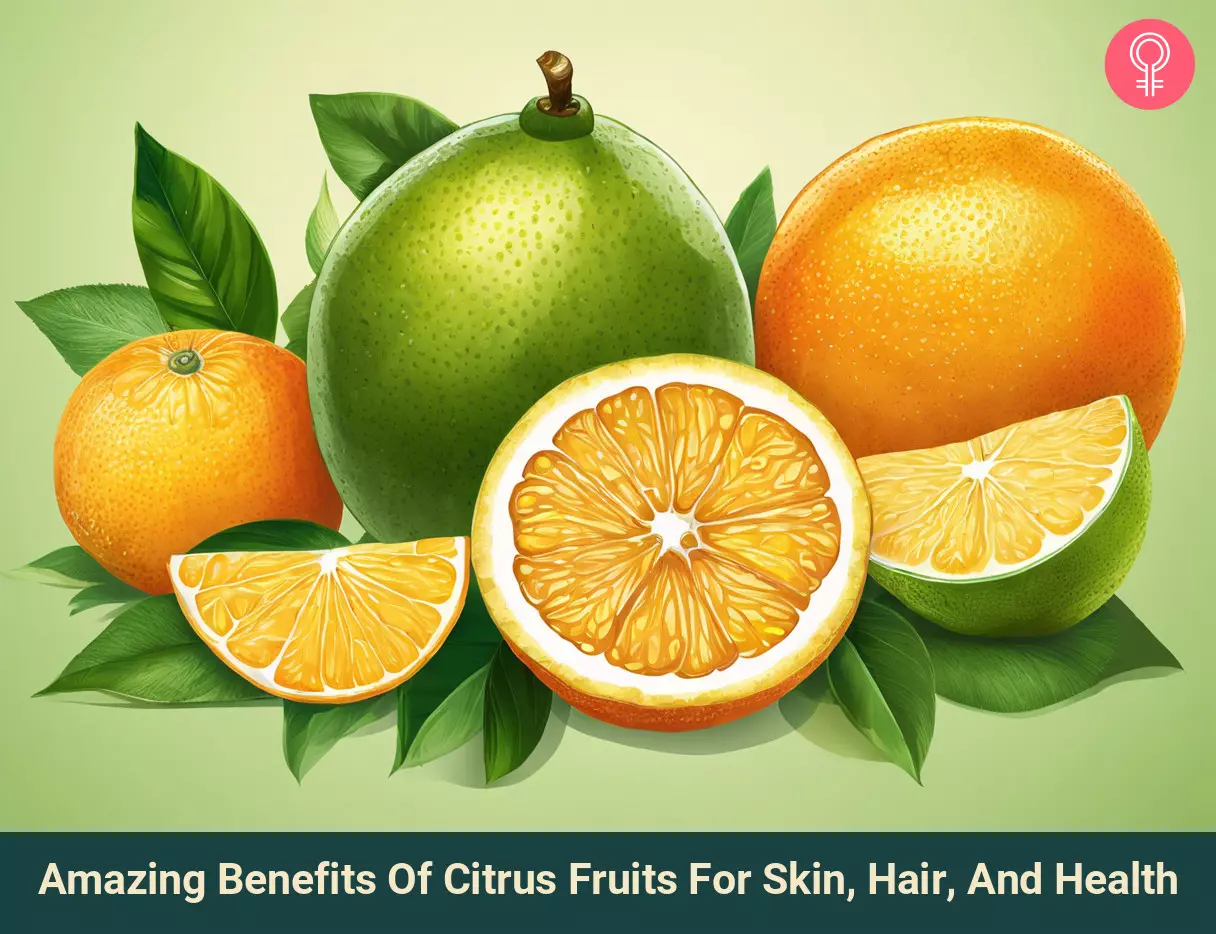
Image: Stable Diffusion/StyleCraze Design Team
Discover the incredible benefits of citrus fruits for your skin, hair, and health. Watch this video to know how to use it to boost your overall health and well-being.
References
Articles on StyleCraze are backed by verified information from peer-reviewed and academic research papers, reputed organizations, research institutions, and medical associations to ensure accuracy and relevance. Read our editorial policy to learn more.
- “Aging- and photoaging-dependent changes of enzymic and nonenzymic antioxidants in the epidermis and dermis of human skin in vivo.” Seoul National University Hospital, Chongno-Gu, Seoul, Korea. 2001 November.
- “Discovering the link between nutrition and skin aging.” Dessau Medical Center, Dessau, Germany. 2012 July.
- “Evaluation of Skin Anti-aging Potential of Citrus reticulata Blanco Peel Pharmacognosy Res.
- “Mechanisms Regulating Skin Pigmentation: The Rise and Fall of Complexion Coloration.” University of Cincinnati College of Pharmacy, Cincinnati, USA. 2009 September.
- “Hair-Growth-Promoting Effects of the Fish Collagen Peptide in Human Dermal Papilla Cells and C57BL/6 Mice Modulating Wnt/β-Catenin and BMP Signaling Pathways.” International journal of molecular sciences, US National Library of Medicine.
- “Handbook of Hair in Health and Disease.” 2012.
- “Orange juice allied to a reduced-calorie diet results in weight loss and ameliorates obesity-related biomarkers: A randomized controlled trial.”
Sao Paulo State University, Brazil. 2017 January. - “Lemon Polyphenols Suppress Diet-induced Obesity by Up-Regulation of mRNA Levels of the Enzymes Involved in β-Oxidation in Mouse White Adipose Tissue.” Sugiyama Jogakuen University, Nagoya, Japan. 2008 October.
- “Dietary flavonoids and risk of stroke in women.” University of East Anglia, Norwich, UK. 2012 February.
- “Citrus Fruit Intake Substantially Reduces the Risk of Esophageal Cancer: A Meta-Analysis of Epidemiologic Studies.” Harvard University, Cambridge, USA. 2017 September.
- “Citrus Fruits shown to be Antiangiogenic and Reduce Risk for some Cancers.” EatToBeatCancer.
- “Intake of dietary flavonoids and risk of epithelial ovarian cancer.” University of East Anglia, Norwich, United Kingdom. 2014 August.
- “Can Stomach Cancer Be Prevented?” American Cancer Society. 2014 May.
- “Vitamin C.” American Optometric Association.
- “Grapefruit juice lets patients take lower dose of cancer drug.” Univerity of Chicago. 2012 August.
- “Eat Right, Drink Well, Stress Less: Stress-Reducing Foods, Herbal Supplements, and Teas.” University of California, Los Angeles, USA.
- “Citrus fruits as a treasure trove of active natural metabolites that potentially provide benefits for human health.“ Beijing University of Chinese Medicine, Beijing, China. 2015 December.
- “Ascorbic acid: its role in immune system and chronic inflammation diseases.” Istituto di Ricovero e Cura a Carattere Scientifico, Italy. 2014 May.
- “Health Benefits of Fruits and Vegetables.” University of Minnesota, St. Paul. USA. 2012 July.
- “Lipid Lowering with Soluble Dietary Fiber.” University of California, Davis, USA. 2016 December.
- “Oranges, raw, all commercial varieties Nutrition Facts and Calories.” SELFNutritionData.
- Grapefruit, raw, pink and red and white, all areas Nutrition Facts and Calories.” SELFNutritionData.
- “Tangerines, (mandarin oranges), raw Nutrition Facts and Calories.” SELFNutritionData.
- “Limes, raw Nutrition Facts and Calories.” SELFNutritionData.
- “Dietary Manipulation With Lemonade to Treat Hypocitraturic Calcium Nephrolithiasis.” University of California, San Francisco, California. November 2005.
- “Dietary treatment of urinary risk factors for renal stone formation. A review of CLU Working Group.” Università Federico II Napoli, Italy. 2015 July.
- “Effects of Regular and Consequent Citrus Fruits Consumption on Vascular Protection.” University Hospital, Bordeaux, France. 2008 August.
- “Frequency of citrus fruit intake is associated with the incidence of cardiovascular disease: the Jichi Medical School cohort study.” Hamamatsu University School of Medicine, Higashi-ku, Hamamatsu, Japan. 2011 March.
- “Chronic consumption of flavanone-rich orange juice is associated with cognitive benefits: an 8-wk, randomized, double-blind, placebo-controlled trial in healthy older adults.” University of Reading, Reading, United Kingdom. 2015 January.
- “About Glycemic Index.” University of Sydney.
- “The relation of low glycaemic index fruit consumption to glycaemic control and risk factors for coronary heart disease in type 2 diabetes.” St Michael’s Hospital, Toronto, Canada. 2010 October.
- “Superfoods That Fight Colds.” Health. 2015 September.
- “Potassium.” MedlinePlus.
- “Potassium and health.” Purdue University, West Lafayette, USA. 2013 May.
- “Beneficial effects of potassium on human health.” University of London, London, UK. 2008 August.
- “Potassium in diet.” MedlinePlus.
- “Grapefruit, raw, pink and red and white, all areas Nutrition Facts and Calories.” SELFNutritionData.
- “Oranges, raw, with peel Nutrition Facts and Calories.” SELFNutritionData.
- Comparison of antioxidant properties of pomelo [Citrus Grandis (L) Osbeck] varieties.” International Food Research Journal.2013 January.
Read full bio of Alexandra Dusenberry
Read full bio of Arshiya Syeda
Read full bio of Ravi Teja Tadimalla
Read full bio of Payal Karnik










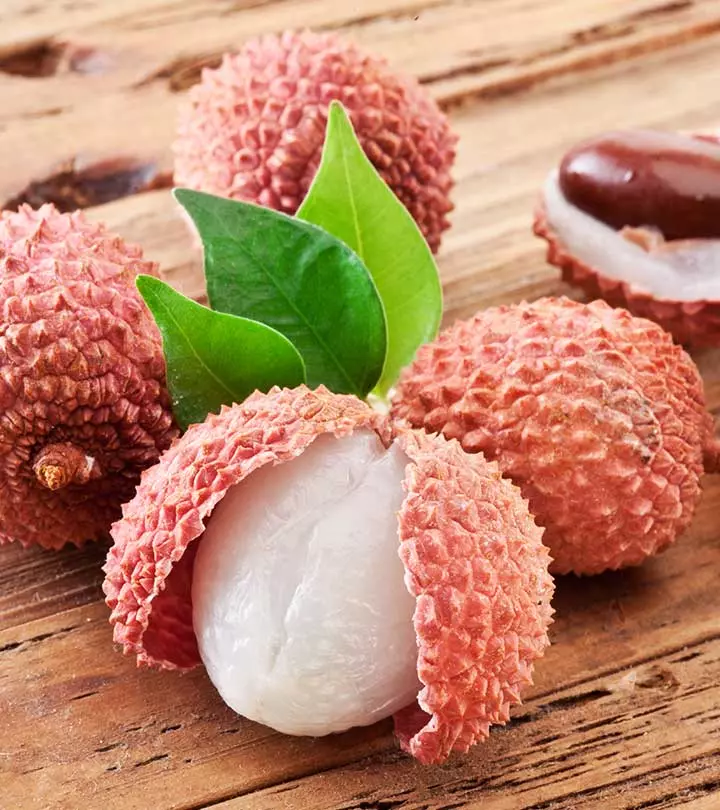



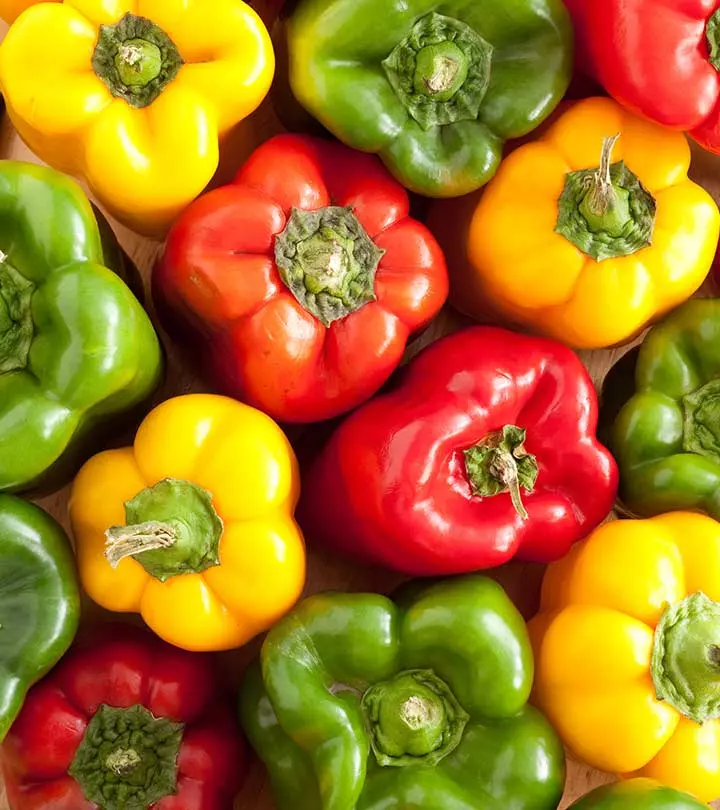




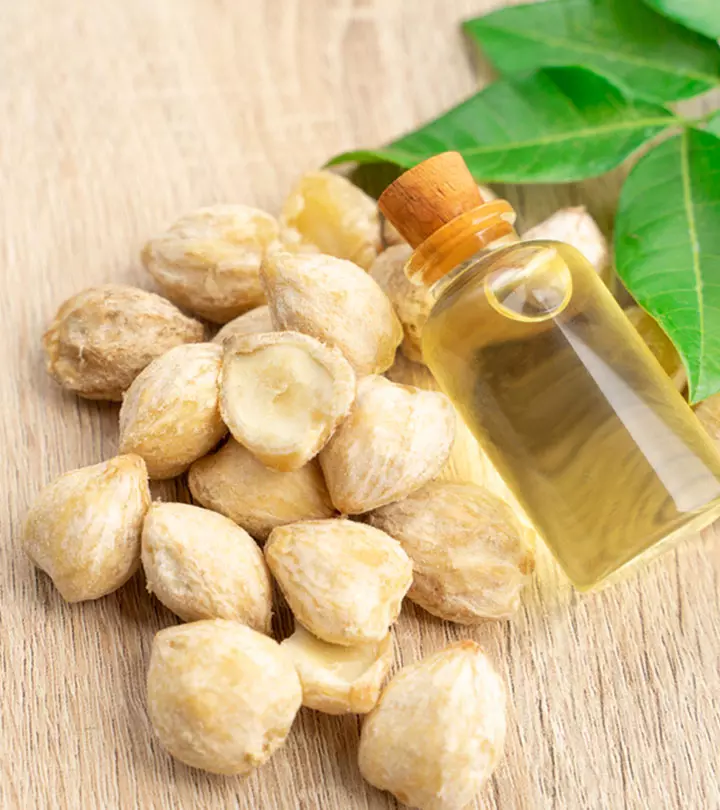
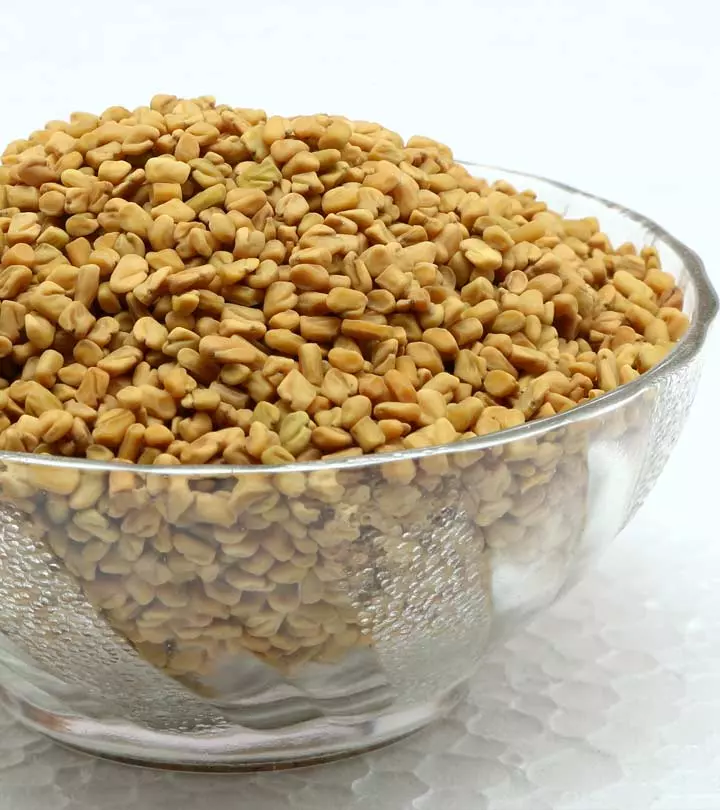
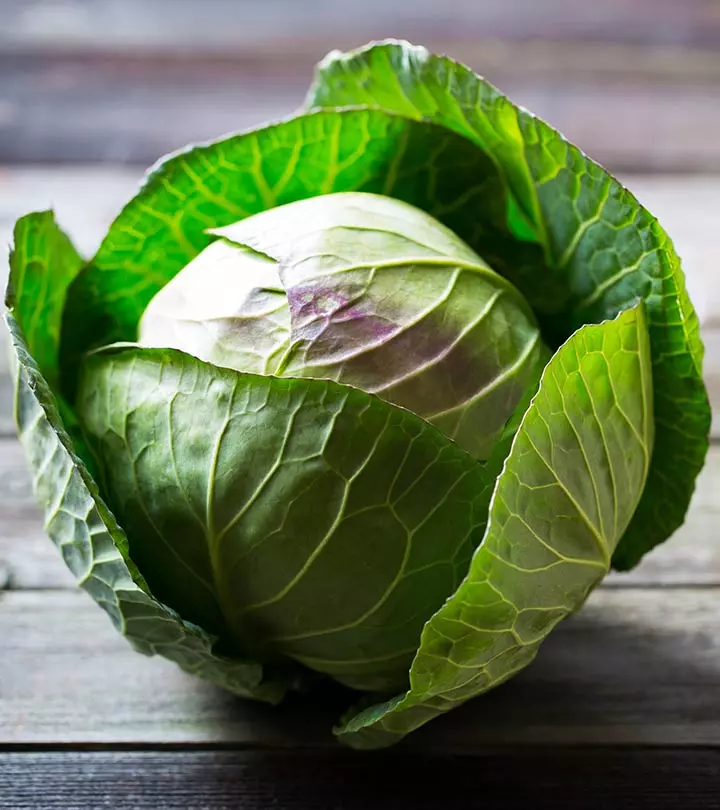

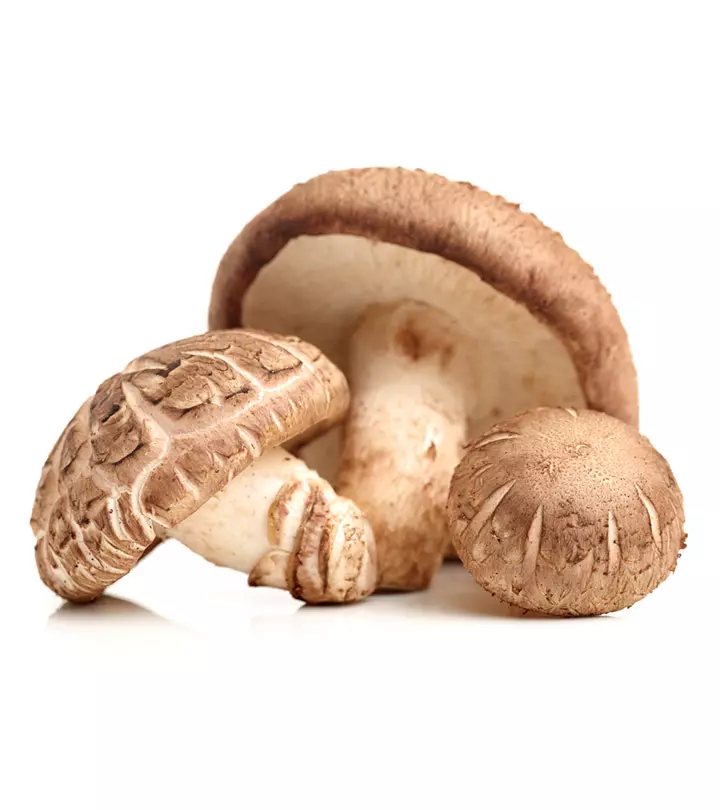
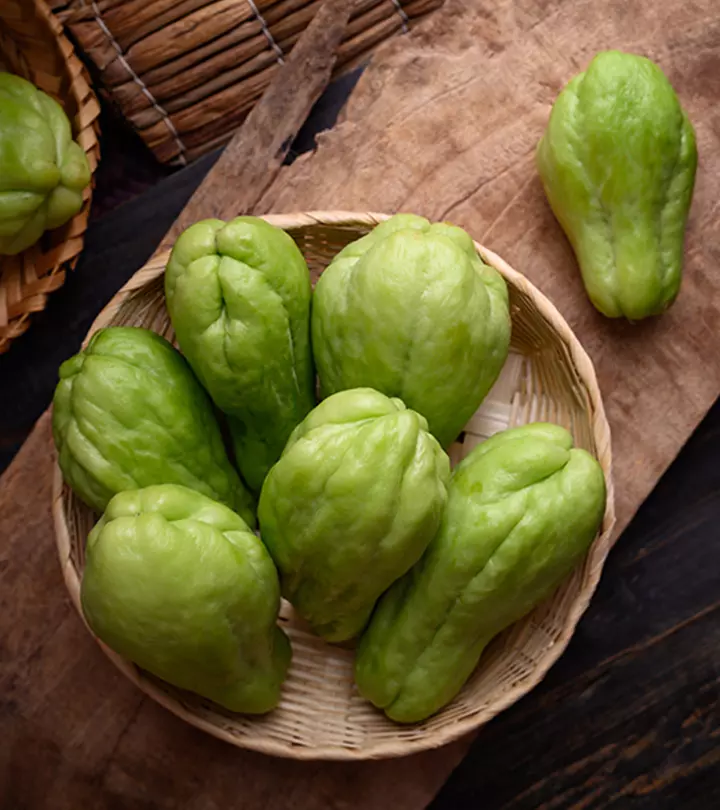
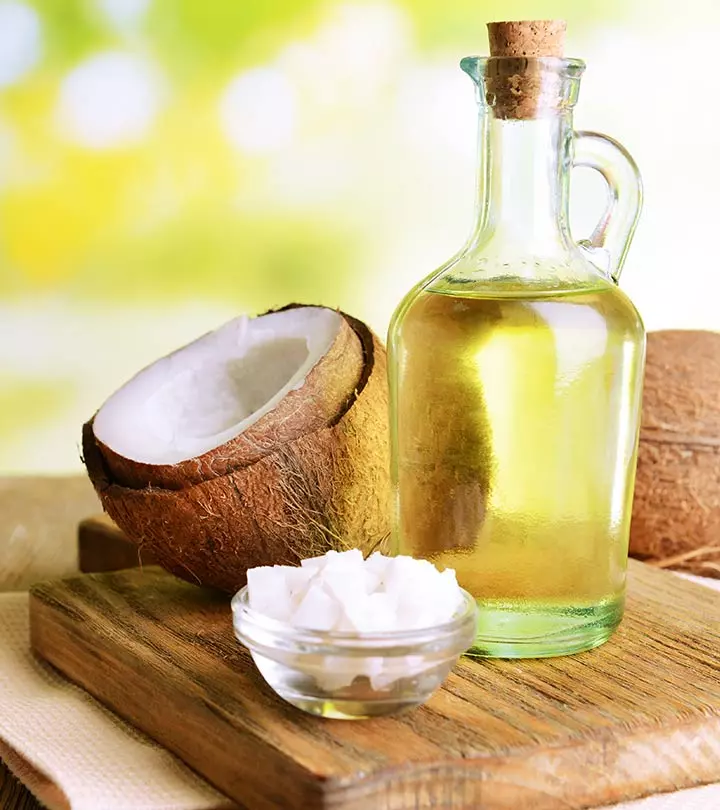
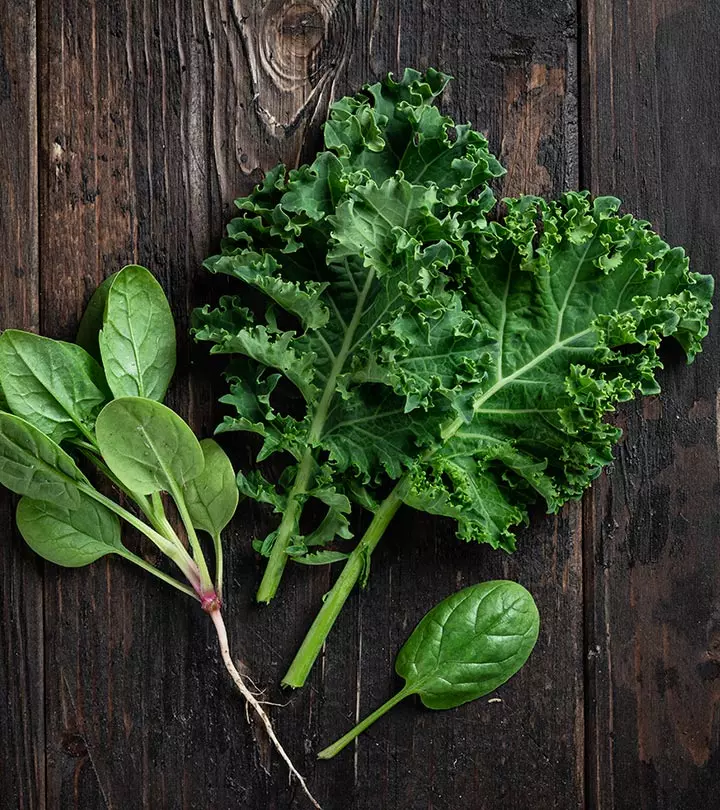
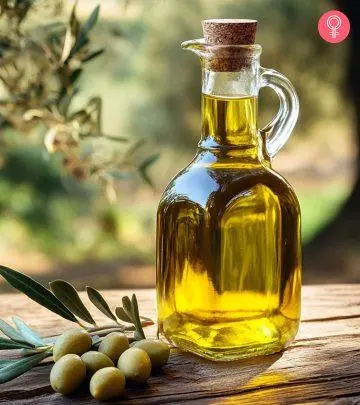
Community Experiences
Join the conversation and become a part of our empowering community! Share your stories, experiences, and insights to connect with other beauty, lifestyle, and health enthusiasts.